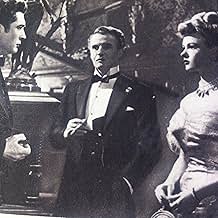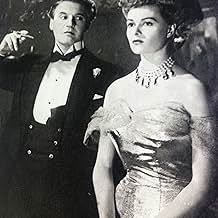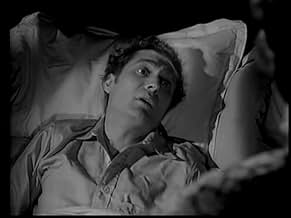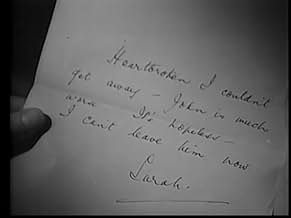An attractive young French girl instigates rivalry between two brothers when she becomes the bride of the younger one.An attractive young French girl instigates rivalry between two brothers when she becomes the bride of the younger one.An attractive young French girl instigates rivalry between two brothers when she becomes the bride of the younger one.
Therese Giehse
- Sister Seraphine
- (as Therèse Giehse)
Maureen Delaney
- Daisy Cobb
- (as Maureen Delany)
Jean Anderson
- Extra
- (uncredited)
Jean Bowler
- Second Programme Seller
- (uncredited)
Featured reviews
Sally Gray weds Patrick Holt, which gives him control over her fortune. When she discovers he's been carrying on an affair, she Investigates a divorce, but it's impossible. However, when it turns out that someone sends Holt a letter that she had run into Dermot Walsh at the lawyers and was seen walking around London with him, his Victorian sense of propriety is offended, and he strikes her. There's a rapprochement, and then he falls ill, is poisoned by his jealous brother Patrick Holt, and dies. Miss Gray goes on trial for the murder.
It's based on an actual murder case, the trial of Florence Maybrick, although those are not the facts of this movie, which is full of men with thundering tempers, an utterly innocent Miss Gray, and loyal servants: just the sort of fillum calculated to appeal to an audience who had made THE MAN IN GREY such a hit a few years before. Brian Desmond Hurst directs capably, but without much conviction.
It's based on an actual murder case, the trial of Florence Maybrick, although those are not the facts of this movie, which is full of men with thundering tempers, an utterly innocent Miss Gray, and loyal servants: just the sort of fillum calculated to appeal to an audience who had made THE MAN IN GREY such a hit a few years before. Brian Desmond Hurst directs capably, but without much conviction.
Beautiful young Sarah Bonheur is enchanted by the cultured Richard Howard who is visiting her château near Bordeaux on a business trip. But Richard suffers his latest and most devastating humiliation by his dominant younger brother John who takes the deal out of Richard's hands and captures the affections of Sarah whom he marries and takes back to Manchester.
But Sarah, despite her best efforts, finds married life in John's gloomy mansion lonely and depressing and turns to Richard for advice. Now fired with hatred and jealousy toward his brother, he does his best to break up the marriage, but is ultimately unsuccessful.
John now falls ill and Richard poisons him, slyly exploiting the latent hostility of the household's servants toward Sarah in framing her for the crime...
This powerful drama is an interesting example of a strand of late 1940s British cinema, but has been long neglected and not shown on British TV for many years, if at all. Set in the late Victorian and early Edwardian eras, it has excellent period detail and the sets effectively highlight Sarah's alienation and despair in the Howards's suffocating and gloomy household.
The director ensures that the film never drags, not something that can be said of all of his work, and it has a sympathetic score from Bernard Stevens, though the sinister chords that greet Richard's appearances are perhaps overdone. Star Eric Portman is memorable in this role, though tends to overact in the crucial courtroom scene. This was becoming a familiar type of role for him at the time, and perhaps contributed to contemporary critics antipathy to the film. His nemesis provides an early part for the likable Dermot Walsh, while the adorable Sally Gray provides a sensitive and intelligent performance as Sarah in a production which underlines the oppressive treatment of women at the turn of the last century.
But Sarah, despite her best efforts, finds married life in John's gloomy mansion lonely and depressing and turns to Richard for advice. Now fired with hatred and jealousy toward his brother, he does his best to break up the marriage, but is ultimately unsuccessful.
John now falls ill and Richard poisons him, slyly exploiting the latent hostility of the household's servants toward Sarah in framing her for the crime...
This powerful drama is an interesting example of a strand of late 1940s British cinema, but has been long neglected and not shown on British TV for many years, if at all. Set in the late Victorian and early Edwardian eras, it has excellent period detail and the sets effectively highlight Sarah's alienation and despair in the Howards's suffocating and gloomy household.
The director ensures that the film never drags, not something that can be said of all of his work, and it has a sympathetic score from Bernard Stevens, though the sinister chords that greet Richard's appearances are perhaps overdone. Star Eric Portman is memorable in this role, though tends to overact in the crucial courtroom scene. This was becoming a familiar type of role for him at the time, and perhaps contributed to contemporary critics antipathy to the film. His nemesis provides an early part for the likable Dermot Walsh, while the adorable Sally Gray provides a sensitive and intelligent performance as Sarah in a production which underlines the oppressive treatment of women at the turn of the last century.
If for no other reason, I suggest checking this film out to watch Eric Portman do an excellent job of acting, as the diabolical Richard Howard. At the start, sympathies are with him, as he appears to be overshadowed by his brother John, who runs the family business and marries Sarah, the woman Richard wanted. That marriage is far from a paradise, and Richard appears to be the sympathetic friend, encouraging Sarah to be herself, not let John browbeat her, and pursue her own interests. John, for his part, comes across as domineering and overbearing, even abusive. Soon, Sarah's filing for divorce, but then has a change of heart. That's when all the trouble begins! (No need to go into detail, I'm sure you can tell from the title what's going to happen.)
The movie's based on the real-life story of Florence Maybrick, accused of murdering her husband, but in movieland, based on tends to mean little fact and lots of fiction, so I'm sure there are better sources for Ms. Maybrick's actual story.
What makes this movie especially worthwhile is the courtroom scene, where Mr. Portman puts on quite a performance, as he defies the judge and courtroom etiquette while attempting to clear his sister-in-law's name. By helping her, he's actually helping himself, and as his plans go awry, he begins to unravel.
As for the rest of the actors and the storyline itself, I'd say it's about average. You won't feel you've wasted your time, but if not for Mr. Portman, you could do without watching.
The movie's based on the real-life story of Florence Maybrick, accused of murdering her husband, but in movieland, based on tends to mean little fact and lots of fiction, so I'm sure there are better sources for Ms. Maybrick's actual story.
What makes this movie especially worthwhile is the courtroom scene, where Mr. Portman puts on quite a performance, as he defies the judge and courtroom etiquette while attempting to clear his sister-in-law's name. By helping her, he's actually helping himself, and as his plans go awry, he begins to unravel.
As for the rest of the actors and the storyline itself, I'd say it's about average. You won't feel you've wasted your time, but if not for Mr. Portman, you could do without watching.
10clanciai
Richard falls in love with Sarah in France and courts her, and then his brother John comes across and steals her away from him. John marries her, and the marriage is not a success, in spite of their one daughter Sally, because for John business is all, and he persists in working himself to death, while he neglects his wife and treats her with cruelty. Richard comes to rescue her, tries to persuade her to a divorce, but that is not legally so easy in Edwardian England. Sarah has another admirer, young Jeremy Thorn, who gets involved in her case, and he is the one who ultimately saves her from both the brothers, who both perish in their innate lifelong conflict mainly because of Richard's envy and inferiority complex.
It's difficult to find a case for either of them, because they both go to recklessness in their passions and get lost in them. However, Eric Portman was a great actor in the 40s, and all his films are extremely interesting and fascinating for his very special performances, and here he excels most of them. In this film you must feel more sympathy and understanding for him than for John, and although it's impossible to acquit either of them for their recklessness, bolting blindly in their passions, for work and for love of Sarah, Eric Portman as Richard is the one you will remember, and the film mercifully refrains from telling the end of the story, although how it will all turn out is all too obvious, but you are grateful for not having to witness it.
By the time of this film Eric Portman was in danger of becoming a caricature.When he runs up the stairs to see his brother I thought he was going to disappear inot a flash of smoke.His performance in the courtroom scene has to be seen to be believed.I think that if the role had been played by someone less stereotyped there is a possibility it might have worked,as it is you can guess what will happen next.
Did you know
- TriviaFilm debut of William Mervyn.
- Quotes
Richard Howard: They'll come for Sarah. She will suffer - she should suffer. She'll find out which one of us she should've married. But she won't hang - I'll see to that, I'll save her. But I'll have her at my feet, grateful, humble, willing.
John Howard: Sarah - at your feet? Not this side of eternity.
Details
- Runtime1 hour 28 minutes
- Color
- Aspect ratio
- 1.37 : 1
Contribute to this page
Suggest an edit or add missing content



































